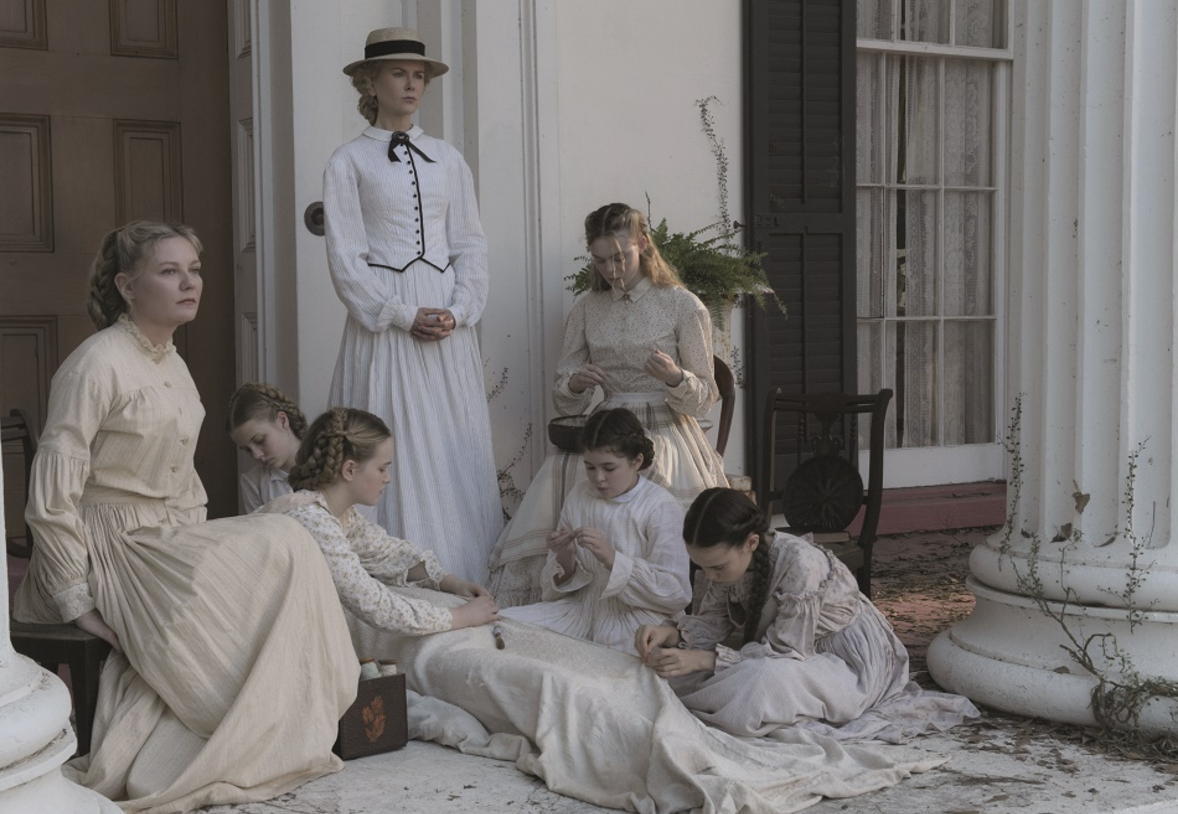Men and women can’t be friends. Especially when there’s a palpable attraction to penetrate. They can really only be lovers or enemies. One usually leading to the other when rejection is at play. Sofia Coppola’s remake of Don Siegel’s Southern gothic, The Beguiled, starring Clint Eastwood is nothing if not further cinematic evidence of this.
Of course, it wouldn’t be laden with Coppola’s unique directorial sensibilities (the ones that got her the Palme d’Or) if there weren’t a few changes afoot–starting with the distinct fact that she doesn’t take it to even half as dark a place as Siegel did. Regardless, Coppola has always had a femme approach to filmmaking, in that even the most sinister of scenes are peppered with a touch of frothiness. In contrast, The Bling Ring, her previous movie before this, whose subject matter rehashes the now illustrious eight teenagers who stole from celebrities’ homes from 2008-2009, addresses a portentous commentary on the modern obsession with fame set against the usual fizz of a Coppola soundtrack and L.A.-imbued cinematography. The Beguiled, on the other hand, marks a somewhat complete departure from Coppola’s usual reliance on music to buttress her films, in almost direct connection to The Bling Ring preceding it. As Coppola recently stated, “I knew that after that movie I wanted to do something beautiful—that’s all I knew… [The Bling Ring] was in such a tacky, ugly world, and I wanted to cleanse myself. I wanted to do something beautiful, so that was my starting point…”
But there’s nothing exactly “pretty” about Miss Martha Farnsworth’s Seminary for Young Ladies. Or maybe there is–until twelve-year-old Amy (Oona Laurence) comes across a Yankee soldier named Corporal John McBurney (Colin Farrell, permitted use of his accent for added “hot”/beguilement factor).
Set three years into the Civil War in rural Virginia (the original favors the slightly more repressed in every way Mississippi as its Southern state backdrop), the first scene highlights a particular bubble of innocence that surrounds the school, accented by Amy’s light-hearted singing and stylized pigtails as she carries a basket through the woods. When put this way, one has to believe the tale of Little Red Riding Hood sublimated Coppola’s consciousness in having Amy unearth a wolf in sheep’s clothing like McBurney. Seeing his wounded leg and debilitated soul, Amy offers to take him to sanctuary at Miss Martha’s, even though he is a Yankee–in spite of being from Dublin.
Miss Martha (Nicole Kidman), the roost-runner of the operation, is immediately up in arms and at a loss for what to do when Amy shows up with McBurney like a cat bringing a dead bird to the porch. Amy is sure to remind her that the “Christian thing” would be to let him recuperate before turning him over to the Confederate soldiers. Alicia (Elle Fanning), the obviously most hyper-sexual of the small group, is the first of the women and girls bold enough to make a move on McBurney as he goes through the healing process. Conversely, the girls’ teacher, Edwina (Kirsten Dunst), plays a more modest angle, wearing that Civil War era garb in a somehow especially staid way. Side note: definitely waiting for Saturday Night Live to parody the sex scene of McBurney ripping off Edwina’s bloomers.
Though McBurney uses his charms on all the women in the house for his own purposes of perhaps amusement and boredom–paired with a lack of desire to return to war–it is Edwina he has the deepest connection with. But it’s far more pleasurable for McBurney to avoid making a decision about any of them, feeding into Alicia’s line to the other girls, “We could really show him some Southern hospitality.” And though Miss Martha doesn’t want to admit it to herself, she, too, is attracted to McBurney. Insisting on his immediate departure on the surface is negated by her latent desire for him to stay, made evident when he ends up sticking around after his leg has mended, reveling in the giggling delight of the women that flank him from all sides–all repressed glances and reserved conversation.
In the same slow-paced style of other films of Coppola that Dunst and Fanning appeared in (Marie Antoinette and Somewhere, respectively), The Beguiled takes its time in building toward a sultry moodiness that boils to the surface in the third act.
While it feels like a polyamorous paradise for awhile there, McBurney is like the poison apple Eve takes a bit out of, eventually serving to taint everything that was pure about the school. Once so beguiled himself by these women, it all quickly turns to shit (as it so often does), with McBurney accusing them of being “vengeful bitches.” It is then that his body suddenly becomes like an offering from the gods, a collective voodoo doll for womankind.





















